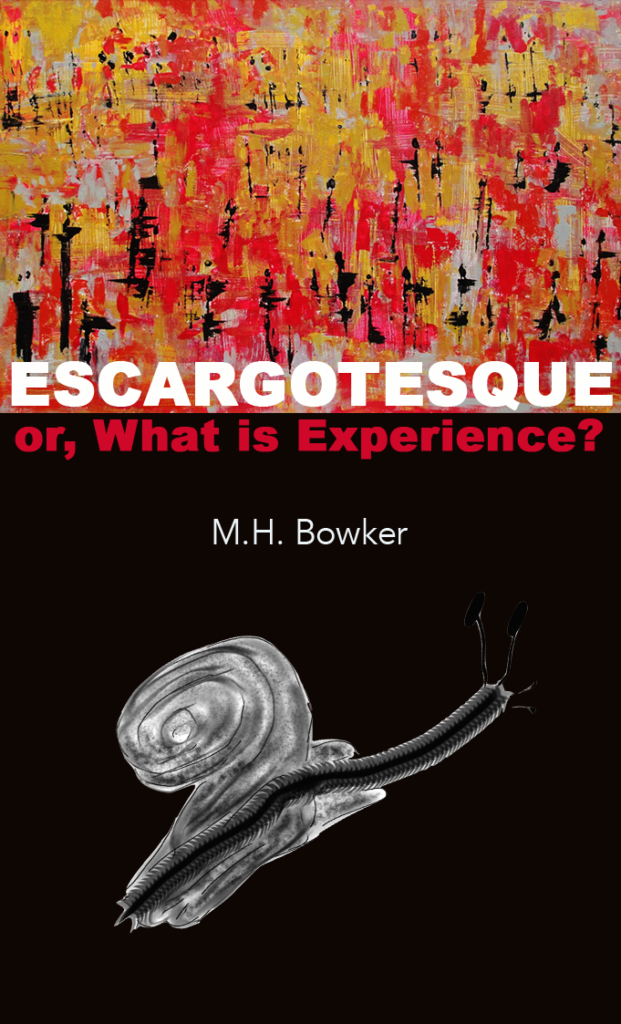“When there are no bathrooms, no bedrooms, no rooms of any kind, you have to masturbate during ‘showers,’ … hiding behind the largest tree in the yard,” writes M.H. Bowker, recounting a pivotal experience while living and working in Porto-Novo, the capital of the West African Country of Benin. It is at this moment that Bowker wonders if “for once, you are ‘out there,’ having ‘real experiences,’ in ‘the real world,’ where ’real people’ don’t enjoy private rooms, hot showers, or leisure time to indulge in unproductive luxuries” (60). Escargotesque is a memoir and a philosophical meditation of a young Bowker’s struggle to ‘truly experience’ himself, the other, and the world by rupturing his privileged status, and discarding with the familiar and the comfortable through his travels. It is the often-heard story of the attempt at cleansing the guilt of western privilege, and reaching enlightenment through an almost physically demanding, or violent means –the kind that would ultimately lead to the death of Christopher McCandless (as documented in Jon Krakauer’s In the Wild, 1996). Bowker is therefore self-conscious, and distrustful of his own actions, as well as the interpretation of his own retelling, or, his document, adding a confessional, and troubled sincerity to the work, which is also interspersed with illustrations by the author.
Often times darkly humorous, unsettling, and nearly tragic, Bowker’s heroic attempts at uncovering real experience lead to a serious illness (is it malaria?), a position as a garbage collector, and, in one instance, threats to he and his romantic partner while in Tangier, a city well known for its mythic history of providing sanctuary and inspiration to prominent artists and literary figures. In his search, Bowker looks to key philosophical figures for answers. There is Kierkegaard and Montaigne, along with trauma theorists, and even body-horror, shock film The Human Centipede (dir. Tom Six, 2009). Is it the experience in of itself? Or must it be traumatic to count? It’s the mind-body problem, so much so that as he lay sick, he writes:
…having been near death, or having mistakenly believed you were near death, will enlighten you about the meaning or meaninglessness of life, will inscribe upon your body a beneficent blessure that will free you from quotidian ennui: an illusion (6).

Returning to Bowker’s moment of clarity during a masturbation session, the author distinguishes between the public and private experience. The inability to hide this “’direct,’ ‘hands-on,’ experience,” in which “ we imagine ourselves to be engaged in a sort of coitus, a relationship, a rendezvous avec l’autre, where when we take our ‘hands off,’ we are merely alone in the private chambers of our minds, playing with ourselves” (61). It is argued, to know oneself, to experience, then, one must know and experience, the other, resulting in a “perplexed agony of mutual interdependence and interpenetration… and the impossibility of secrets due to intrusive knowing…” (63).
These dichotomies, thinking-acting, private-public, are problematized by the thinking-acting of the virtual-experience, which authors a new standard for authenticity. An increasingly global human (even if a myth) is conditioned to believe there is a real journey through the Google map, or, there is engagement in the slums through slacktivism and “street view,” when one can physically affect the other without physically being-there. Bowker’s public masturbation happens now everyday, electronically, both mentally (as in declarations of one’s everyday experience as meaningful, even in their apparent banality) and physically (the interior private space made available for sexual release –the n00dz and DIY net-porn). Also, see the recent string of “where I’ve been” maps proudly shared across the Internet; one must wonder if simply flying over these boundaries, or driving past them is ample enough to constitute being-there –a citizen of the world.

One is left wondering what Bowker’s adventure would have been like had it occurred today. In many ways the struggle for authenticity relates the same problems, but new questions are posed through the blurred boundaries of experience and the digital body. Escargotesque is fraught with the author’s fears, failures, and self-consciousness –an authenticity in an era that highly values and simultaneously exploits openness. It is a worthy read for those who are troubled by our current modes of experience and connection, and a gift to those who aren’t.
***

Norberto Gomez Jr. is a multi-media artist, curator and independent scholar based in Baltimore, Maryland. His research interests include popular and digital culture, and the intersection between technology and mysticism. He is currently writing and illustrating a short book on art and influence, producing a second collection of solo music under the moniker of CANNIBAL BOOM, researching issues of death in the digital age, and freelancing for Fangoria magazine. He holds a PhD in Media, Art & Text from Virginia Commonwealth University (2013), and an MFA in painting and drawing from University of Houston (2009). He continues to perform and exhibit nationally. www.norbertogomezjr.com & info@norbertogomezjr.com & you can follow him @theIKZ.




